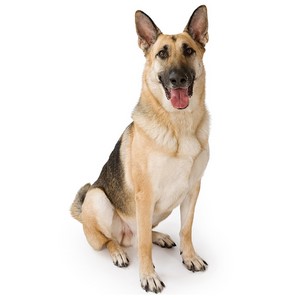German Shepherd Dog Breed
Thinking of getting a German Shepherd Dog and want to know if a German Shepherd is suitable for your household?
Use the German Shepherd information on this website to learn more about adaptability, health issues, life span of German Shepherd and more.
German Shepherd Facts
- Name: German Shepherd
- Other Names: Alsatian (UK), Alsatian wolf dog (UK), Berger Allemand, Deutscher Schäferhund, Schäferhund
- Origin: Germany
- Breed Group: Herding (AKC:1908, UKC)
- Breed Type: Purebred
What to do if you lose your German Shepherd
If your German Shepherd Dog or any other pet has gone missing and it does not have an identification tag with a phone number, you can:
1. Report your missing pet details at Pet Reunite website here.
2. Report the lost pet on the Local Facebook Lost Pets Groups Here.
3. Telephone the local vets to see if someone has brought in your lost pet.
4. Telephone the RSPCA or Visit the RSPCA Lost Pets website and complete a Lost Pet Report.
5. Visit Lost Pets Pages of Animal Pounds.
What to do if you find a lost German Shepherd
If you find a German Shepherd Dog or any other pet and it does not have an identification tag with a phone number, you can:
1. List the found pet details at Pet Reunite website here.
2. List the missing pet on the Local Facebook Lost Pets Groups.
3. Call the Local Authority to collect the lost animal.
4. Take the animal to the local Animal Pound assigned to your suburb.
5. Take the animal to the local Vet Clinic who can scan the animal’s microchip and contact the registered pet owner.
Laws Regarding Missing Pets
1. It is against the law to keep any animal that you find.
2. Pets are generally considered property and it is illegal to take and keep someone else’s property.
3. You must call your local animal control unit and file a FOUND AN ANIMAL report for any dog or cat you find.
4. To reclaim your lost dog, cat or other pet from the animal shelter you must pay a release fee.
5. If your dog or cat is unregistered, you will have to register your pet before you can take it home.




